Pacheco removed Geraldine Amato from where I stood after she got into an altercation with Council President Debbie O’Malley.
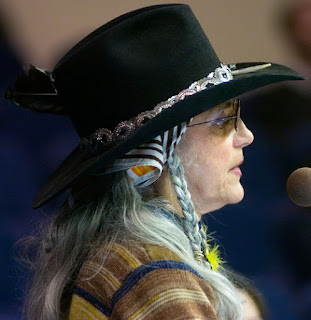 Amato, left, is a regular participant in the governmental process. Her attendance is as prompt as any councilor, county commissioner or member of other meetings. She prefers meetings that are televised by the GOV TV – Government Television Cable Channel 16, http://www.cabq.gov/govtv/, and the Teach and Learn Network educational access cable channel 96, http://www.knmetv.org/education/talnet. She has her own talk show, “Amato's Debates,” on the public access channel 27, http://www.quote-unquote.org/, which airs on Thurs. at 5:00 pm. She does all she can to get her political views to the public without spending any money. She has run for political office, including, District Attorney and Bernalillo County Sheriff. She is a social security pensioner who had been a reader for the blind. She shepherded two law students through UNM’s law school.
Amato, left, is a regular participant in the governmental process. Her attendance is as prompt as any councilor, county commissioner or member of other meetings. She prefers meetings that are televised by the GOV TV – Government Television Cable Channel 16, http://www.cabq.gov/govtv/, and the Teach and Learn Network educational access cable channel 96, http://www.knmetv.org/education/talnet. She has her own talk show, “Amato's Debates,” on the public access channel 27, http://www.quote-unquote.org/, which airs on Thurs. at 5:00 pm. She does all she can to get her political views to the public without spending any money. She has run for political office, including, District Attorney and Bernalillo County Sheriff. She is a social security pensioner who had been a reader for the blind. She shepherded two law students through UNM’s law school. According to Pacheco, left, who is regularly assigned as security at city council meetings, Amato was standing in the stairwell and blocked a council staffer who was trying to get to the dais.
According to Pacheco, left, who is regularly assigned as security at city council meetings, Amato was standing in the stairwell and blocked a council staffer who was trying to get to the dais.O’Malley approached and physically confronted Amato. Pacheco observed them from the press booth and started to cross the chamber. He had to go into the hall to get to the other side and when he reentered the room, he saw papers flying. Apparently, Amato had grabbed some papers O’Malley was holding. When Pacheco got close enough, he asked O’Malley if she wanted him to remove Amato. She did and he escorted her out of the chambers.
Amato filed a 20-page complaint with the independent review officer against Pacheco.
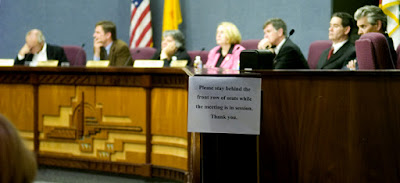 City council staff posted the warning, “Please stay behind the front row of seats while the meeting is in session. Thank you,” pictured above.
City council staff posted the warning, “Please stay behind the front row of seats while the meeting is in session. Thank you,” pictured above.
As the meeting started, Director of Council Services Laura Mason, right, approached me and told me I would have to move about 10 feet away from where I have stood photographing for the better part of 20 years.
Amato, below right, is seen complaining to Pacheco that the TV videographer from KOB Eyewitness news was not behind the front row. Mason also asked him to move and he did.
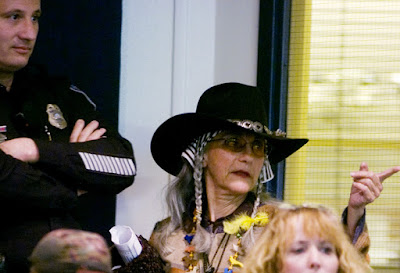 So what’s wrong with this picture?
So what’s wrong with this picture? Amato has a long history of irritating a number of public bodies and has driven several of them to take steps to minimize her appearance and stifle her speech. She complains about the current structure of governments and the interdependency of local government on federal influences and mandates. She sees a narrowing between the states from the federal government. Her theories of the federalist republic harkens back to the days of the Articles of Confederation that separated the states from each other and the central government. It was deemed unworkable and the Constitution was written and ratified. She doesn’t much like where 200 plus years of governmental evolution has brought us and she’s not afraid to say so.
Amato sat strategically behind the podium, so that when the government access cable station’s coverage of meetings focused on presentations and citizens making public comments, she would appear on camera.
Several current and former city employees, who have asked to remain off the record, have expressed a degree of contempt for Amato. She has aggravated many, wears what is seen by some as garish clothing and is viewed as trying to upstage the proceedings. The biggest complaint is the repetitive nature of her comments.
Amato claims she has a bad back and brings a supportive pillow on occasion. She will get out of her seat and walk around the chamber. She often times will laugh or blurt out a comment reacting to a statement she seems to finds hypocritical. Some of her critics claim she may have a pathological need to be noticed.
 The Bernalillo County Commission began roping off the section of the audience that was the backdrop of the GOV TV’s wall-mounted camera. It is much like the area in center field at some major league baseball parks that have no spectators and are painted black or a dark color to create a contrast, so the batter has a chance of seeing the ball as it leaves the pitcher’s hand. GOV TV’s coverage o the City Council and Police Oversight Commission also maintained the same roped off area. By blocking off up to 15 seats, it keeps any movement behind the podium from distracting the viewing audience.
The Bernalillo County Commission began roping off the section of the audience that was the backdrop of the GOV TV’s wall-mounted camera. It is much like the area in center field at some major league baseball parks that have no spectators and are painted black or a dark color to create a contrast, so the batter has a chance of seeing the ball as it leaves the pitcher’s hand. GOV TV’s coverage o the City Council and Police Oversight Commission also maintained the same roped off area. By blocking off up to 15 seats, it keeps any movement behind the podium from distracting the viewing audience. 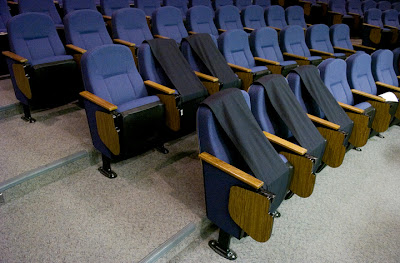 A couple of years ago, the County Commission moved its public comments section to before the beginning of their regular televised agenda. Earlier this year, the Albuquerque Public Schools also took steps to move public comments out of the public eye.
A couple of years ago, the County Commission moved its public comments section to before the beginning of their regular televised agenda. Earlier this year, the Albuquerque Public Schools also took steps to move public comments out of the public eye. Councillor Don Harris, currently has a rules amendment proposal to eliminate general public comments from regular meetings. Instead, he would have a separate special meeting, once a month for public comment limited to a “City Government related matter.” The meetings would take place prior to the start of an already scheduled city council committee meeting. His proposal was postponed. He had previously suggested moving public comments to the last item on the agenda.

The New Mexico Open Meetings Act is pretty clear.
§10-15-1. Formation of public policy; procedures for open meetings;
exceptions and procedures for closed meetings
A. In recognition of the fact that a representative government is dependent upon an informed electorate, it is declared to be public policy of this state that all persons are entitled to the greatest possible information regarding the affairs of government and the official acts of those officers and employees who represent them. The formation of public policy or the conduct of business by vote shall not be conducted in closed meeting. All meetings of any public body except the legislature and the courts shall be public meetings, and all persons so desiring shall be permitted to attend and listen to the deliberations and proceedings. Reasonable efforts shall be made to accommodate the use of audio and video recording devices.

In trying to deal with what the council and its staff see as a problem with Amato, their solution steps squarely into the requirements of the open meetings act.
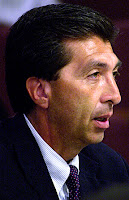 “The current design and arrangement of furniture in the City County Council Chambers restricts the ability of the public and press to see the proceedings clearly” I wrote in a March 30, 1995, letter to then Director of Council Services Mark Sanchez, left. “The presence of oversized tables with an excessive staff on the City Council side and the established presence of the Mayor/CAO (Chief Administrative Officer) on the other side of the podium effectively creates a physical barrier that excludes and blocks the free participation and exchange with the public.” This was after he had insisted I move from the same vantage point where I had been working on a video documentary. I moved and “Local television news cameramen then took up virtually the same position you ordered me from,” I wrote.
“The current design and arrangement of furniture in the City County Council Chambers restricts the ability of the public and press to see the proceedings clearly” I wrote in a March 30, 1995, letter to then Director of Council Services Mark Sanchez, left. “The presence of oversized tables with an excessive staff on the City Council side and the established presence of the Mayor/CAO (Chief Administrative Officer) on the other side of the podium effectively creates a physical barrier that excludes and blocks the free participation and exchange with the public.” This was after he had insisted I move from the same vantage point where I had been working on a video documentary. I moved and “Local television news cameramen then took up virtually the same position you ordered me from,” I wrote.After the dust settled from the letter, I returned to the same location and until now, managed to get along just fine with the rest of the still, video photographers, council, staff and administrators.

The problem is not the news media, rather it's Amato. I have on more than one occasion, including Monday night, had to get her attention because she was blocking the aisle and was so engrossed in shuffling her papers that she was oblivious to wheelchair bound citizens who were making their way to the podium as part of a presentation on the issue of public access restrictions for persons with disabilities.
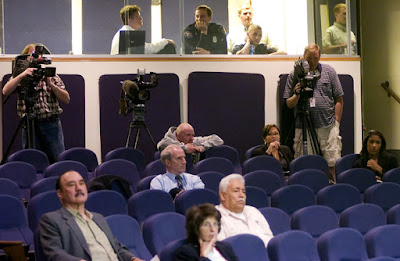 The television news photographers all dutifully acquiesced removing themselves to the back of the chambers. The result of following the legally questionable order is that the visual press is no longer able to adequately provide for the public, whom are, “entitled to the greatest possible information regarding the affairs of government.” Instead, the television cameras are only able to shoot the backs of balding heads of city administrative leaders.
The television news photographers all dutifully acquiesced removing themselves to the back of the chambers. The result of following the legally questionable order is that the visual press is no longer able to adequately provide for the public, whom are, “entitled to the greatest possible information regarding the affairs of government.” Instead, the television cameras are only able to shoot the backs of balding heads of city administrative leaders.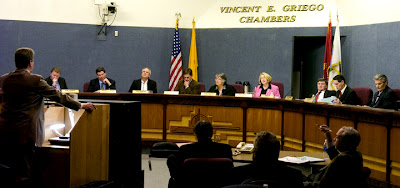 It is neither compelling TV nor the access called for in the open meetings act.
It is neither compelling TV nor the access called for in the open meetings act. If Amato is causing problems, then bring the right laws into play for the right solution.
Over the years, I have become experienced with dealing with disruptions at public meetings. Seldom are they handled well or legally. The first problem is that the ego of elected officials become involved. Their perceived authority is challenged and they don’t react well. Officers, present at meetings to maintain the peace, defer to the presiding officer and tend to use the wrong law. There is a state statute:

§30-20-13. Interference with members of staff, public officials or the general public; trespass; damage to property; misdemeanors; penalties. (1981)
C. No person shall willfully refuse or fail to leave the property of or any building or other facility owned, operated or controlled by the state or any of its political subdivisions when requested to do so by a lawful custodian of the building, facility or property if the person is committing, threatens to commit or incites others to commit any act which would disrupt, impair, interfere with or obstruct the lawful mission, processes, procedures or functions of the property, building or facility.
E. Nothing in this section shall be construed to prevent lawful assembly and peaceful and orderly petition for the redress of grievances, including any labor dispute.

The tricky part of the language is that the “a lawful custodian of the building,” must make the request. In this case that should not have been a big problem because the lawful custodian of the building is the Chief Administrative Officer Bruce Perlman, who would have been sitting closest to Amato. The law does not allow for delegation of who is a lawful custodian. Though O’Malley, as president of the council, has control of the meeting, she has to use the proper channels to enforce what is ostensibly a sergeant at arms role for the officer. However, Pacheco, had good criminal law available to him, in the form of disorderly conduct for what he witnessed.

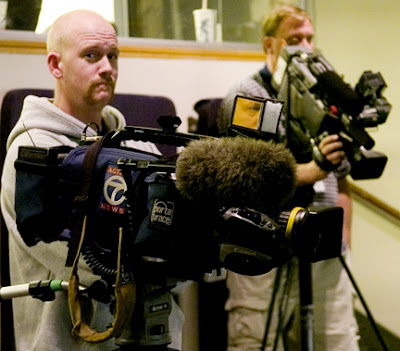 As for the still and video photographers, it’s hard enough getting anything more than a profile shot of citizen participation in government, but a profile shot from behind the ear is simply unacceptable. I will be returning to the front of the chambers and am sure that the other photographers will follow.
As for the still and video photographers, it’s hard enough getting anything more than a profile shot of citizen participation in government, but a profile shot from behind the ear is simply unacceptable. I will be returning to the front of the chambers and am sure that the other photographers will follow. As for Amato, she invoked my name in telling Pacheco that she could stand in the same place I do. However, I remain aware of my surrounding situation and am constantly making room for those who travel the room, as I also do for the television cameras.
If Amato were a visual journalist, then maybe she could invoke such standing, but she is not.
As for the council and its staff, follow the law and allow the working press to do their jobs under the open meetings act. Don’t punish the media for the council’s inability to appropriately deal with Amato’s behavior.
2 comments:
However hard it is for officials to listen to Amato; she never has more than two minutes; a small sacrifice compared to the others that have been made in support of the right to free speech, and the right to participate meaningfully in one's own government.
Shame on the city council, the county commission and the board of ed.
Also shame on the the author for blaming Amato for his problems. While I appreciate the need for news photos, the paparazzi in this country seem to be, in part, populated by a bunch of selfish, needy hypocrites, who use their power in the media to ridicule people just to serve their own self-interests. And that is what this whole article seems to be, to me.
Post a Comment